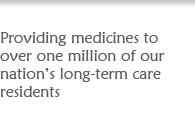|
What are long-term care pharmacies?
Long-term care (LTC) pharmacies dispense pharmaceuticals, sterile intravenous drugs and nutritional products ordered by physicians to patients in nursing homes, assisted living facilities, hospice programs, and similar institutional sites of care.
How are long-term care pharmacies different from other pharmacies?
LTC pharmacies provide a standard of service that goes far beyond that provided by retail or chain drugstores. This level of service is based upon the needs of the patients and facilities we serve.
Patients in institutional settings have special needs - they are elderly, frail, chronically ill, and can no longer care for themselves.
LTC pharmacies provide special services to these patients with special needs and the facilities that care for them.
For instance, LTC pharmacies
· dispense prescriptions in unit-dose formats, instead of bottles or vials, packaging the drugs individually for accurate and safe administration by nursing staffs;
· deliver all prescription orders to the facilities, around the clock and whenever emergencies arise, since our patients can't come to us; and
· provide the services of consultant pharmacists, who leave the pharmacy and go directly to facilities to help physicians and nurses improve therapeutic outcomes and reduce medication-related problems for their patients.
Click here to see a dozen key differences between long-term care pharmacies and retail pharmacies
What differences do these special services make?
These special services keep patients more healthy and safe and, at the same time, can help payers control pharmaceutical costs.
For instance, unit-dose packaging and dispensing systems enable LTC pharmacies to prepare patient-specific medication packages that are ready and easy to administer. Studies show that these systems increase resident safety by reducing errors in drug administration and are particularly critical in settings like long-term care, where most patients are taking multiple drugs. LTC pharmacies also design their dispensing systems with multiple checkpoints to prevent potentially adverse drug interactions or patient reactions, and maintain customized medication administration records for their client facilities.
LTC pharmacies also save money for payers. For instance, LTC pharmacies develop formularies - lists of preferred drugs -- in consultation with pharmacists, physicians and nurses to assure medically appropriate and cost-effective drug use.
LTC pharmacies, unlike retail pharmacies, also employ consultant pharmacists who conduct monthly drug regimen reviews (required by federal law) for each resident at a facility to assess the appropriateness and efficacy of drug therapies. Based on their findings, these consultant pharmacists often recommend alternate therapies or the discontinuation of unnecessary drugs.
Consultant pharmacists also contribute to more cost-effective pharmaceutical care by working with physicians on "therapeutic interchange" programs-- switching to a different medication known to be equally effective but less expensive than the original drug ordered.
These special services that ensure safe and optimal drug therapy for patients and can reduce overall pharmaceutical costs to the government are what make LTC pharmacies unique.
What is the Long Term Care Pharmacy Alliance?
The Long Term Care Pharmacy Alliance (LTCPA) represents the five major national long-term care pharmacies - Kindred Pharmacy Services, Omnicare, NCS Healthcare, NeighborCare, and PharMerica. Together, LTCPA member companies serve more than 1.5 million people including more than two-thirds of all nursing facility residents through networks of nearly 500 pharmacies nationwide.
For more information on long-term care pharmacies, contact us.
|


